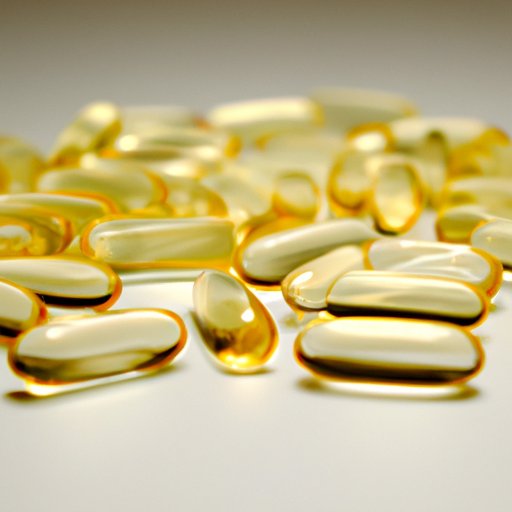
Introduction
Vitamin D is a fat-soluble vitamin that plays an essential role in regulating calcium and phosphate levels in the body. It is crucial for maintaining bone health, supporting the immune system, and preventing chronic diseases such as cancer, diabetes, and heart disease. However, like any other nutrient, taking too much of it can lead to adverse effects.
In this article, we will explore the risks and benefits of vitamin D supplementation and how to avoid overdose. We will also discuss the symptoms and long-term effects of vitamin D toxicity, the difference between vitamin D deficiency and overdose, and tips for safely increasing vitamin D intake.
The Dangers of Vitamin D Overdose and How to Avoid It
While vitamin D is necessary for overall health, too much of it can be harmful. Taking excessive amounts of vitamin D can lead to hypercalcemia, a condition characterized by high levels of calcium in the blood. Hypercalcemia can cause symptoms such as nausea, vomiting, constipation, confusion, and kidney damage.
To avoid vitamin D overdose, it is essential to follow the recommended daily intake and seek medical advice before taking vitamin D supplements. Overdose is more likely to occur in individuals taking high doses of vitamin D without medical supervision, such as those with a history of calcium deficiency, kidney disease, or certain medications.
How Much Vitamin D is Too Much: Understanding Safe Limits
According to the National Institutes of Health, the recommended daily intake of vitamin D for most adults is 600-800 IU (International Units) per day. However, this amount may vary depending on age, gender, health status, and sun exposure.
Vitamin D toxicity occurs when blood levels of 25-hydroxyvitamin D (25(OH)D) exceed 150 ng/mL. This level can be reached by taking more than 10,000 IU of vitamin D per day for several months or taking a massive one-time dose of vitamin D supplements.
The Side Effects of Too Much Vitamin D You Need to Know
While vitamin D overdose is relatively rare, it can cause various adverse effects, including:
- Hypercalcemia: high levels of calcium in the blood, which can lead to kidney stones, kidney damage, and other complications
- Nausea, vomiting, and poor appetite
- Constipation or diarrhea
- Weakness and fatigue
- Confusion and disorientation
- Heart rhythm abnormalities
Moreover, long-term vitamin D overdose can cause calcification of soft tissues, such as the heart, lung, and blood vessels, which can lead to severe health problems.
Vitamin D Toxicity: What Happens When You Take Too Much
Vitamin D toxicity occurs when the level of 25(OH)D in the blood reaches an excessive level. This condition can lead to hypercalcemia and its related complications, such as kidney damage, heart disease, and bone loss.
Diagnosis of vitamin D toxicity is based on measuring the level of 25(OH)D in the blood and assessing symptoms and underlying conditions. Treatment may include discontinuing vitamin D supplements, increasing fluid intake to flush out excess calcium, and other medications to lower calcium levels.
The Difference Between Vitamin D Deficiency and Overdose
Vitamin D deficiency occurs when the body does not get enough vitamin D from sunlight, diet, or supplements. Deficiency can lead to rickets in children and osteoporosis in adults, among other conditions.
The symptoms of vitamin D deficiency include:
- Weak bones and joints
- Muscle weakness and pain
- Increased risk of falls and fractures
- Depression and mood changes
- Weakened immune system
In contrast, vitamin D overdose is characterized by high levels of 25(OH)D in the blood and can cause the symptoms described above.

The Possible Risks of Taking Vitamin D Supplements in Excess
While vitamin D supplements are generally safe and effective when taken in recommended amounts, excessive intake can lead to overdose and other health risks. For example, taking too much vitamin D can contribute to hypercalcemia and interfere with the absorption of other essential nutrients, such as magnesium, and lead to their deficiency.
In some cases, taking high doses of vitamin D can interact with certain medications and cause adverse effects. For example, vitamin D can interfere with the action of drugs used to lower cholesterol, such as statins, and increase the risk of muscle pain and weakness.
Tips for Safely Increasing Your Vitamin D Intake Without Exceeding the Recommended Amount
If you suspect that you have vitamin D deficiency or need to increase your vitamin D intake, there are safe and effective ways to do so:
- Get more sunlight exposure: Your skin produces vitamin D when exposed to sunlight, so spending some time outdoors can help increase your vitamin D levels.
- Eat vitamin D-rich foods: Some foods are naturally high in vitamin D, such as fatty fish, egg yolks, and mushrooms. Fortified foods such as milk, cereal, and orange juice are also good sources of vitamin D.
- Take vitamin D supplements as directed: If you decide to take vitamin D supplements, make sure to choose a reputable brand and follow the recommended dosage. Taking more than 4,000 IU of vitamin D per day is not recommended unless advised by a healthcare professional.
Conclusion
Vitamin D is a vital nutrient that supports many body functions, but taking too much of it can lead to health problems. It is essential to follow the recommended daily intake and seek medical advice before taking vitamin D supplements. Symptoms of vitamin D overdose include hypercalcemia, nausea, vomiting, and constipation, among others. Long-term effects of vitamin D toxicity can include soft tissue calcification and damage.
If you suspect that you have vitamin D deficiency or need to increase your vitamin D levels, there are safe and effective ways to do so. By getting more sunlight exposure, eating vitamin D-rich foods, and taking vitamin D supplements as directed, you can optimize your vitamin D intake and reduce the risk of overdose.




